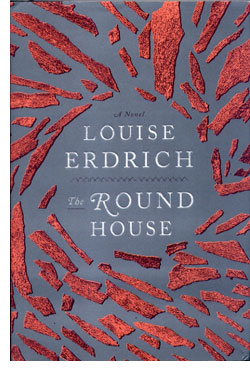 |
 |

Louise Erdrich
The Round House
Harper / HarperCollins
US Hardcover First Edition
ISBN 978-0-062-06524-7
Publication Date: 10-02-2012
324 Pages; $27.99
Date Reviewed: 11-02-2012
Reviewed by: Rick Kleffel © 2012
Index:
General Fiction
Mystery
The transition from childhood to adulthood is not the blessed time we would like to believe it to be. There are moments when joy and wonder mix with the love we feel from our families to create the sort of heaven we can only identify in hindsight, to be sure, but those moments are outnumbered by other more troubling times. The adult world is not what we expect. And the aspects of that world we think we desire often prove to rife with the kind of pain that lasts a lifetime.
Louise Erdrich's 'The Round House' captures those moments, and many more in the peculiarly insulated — and unprotected — world of an Ojibwe native American community. It's 1988, and Joe Coutts is leading a fairly typical thirteen-year-old's life. He rides his bike a lot, he plays video games, he has a gang of friends, and two stable, loving parents; Bazil, a tribal judge, and Geraldine, the enrollment expert. Everything works, easily, until the day his mother comes home late; very late and clearly traumatized. In fact, she's been viciously attacked, and someone must pay for the crime.
Erdrich's rich, evocative prose is a pleasure to read. There's a slightly rough, handcrafted feel to the novel. Joe's world — the world of the reservation — is a lot ours, but not exactly. Erdrich has a way with telling, seemingly trivial details that somehow convey a deep, emotional heft. Dialogue is sparse and has the ring of disjointed truth. Erdrich tells most of the story (uncharacteristically) in Joe's first person voice, using a dual perspective of remembered experience and lived experience. That is, an older, wiser, Joe tells the story, but himself becomes immersed in his youthful, not-so-wise perspective. This is a difficult trick to pull off, and Erdrich does it so seamlessly that you not notice but for the overall power.
The rest of the cast, some of whom we have met in Erdrich's other novels, show up from Joe's perspective, and thus, in a new light. Joe's father, Bazil, is cautious, almost to a fault, but invested with an inner compass and confidence that gives him a real sense of understated power. The Trickster figure, Mooshum, provides surreal comic relief, while Joe's friends, Cappy, Zack and Angus, are perfect boys for this story; a bit odd, a bit outcast, and yet, entirely normal. There are some very bad folks around as well, and their reveals are superbly handled by Erdrich.
At the core of this novel are concerns about the murky legalities of tribal life; how seemingly arbitrary laws and lines change jurisdiction and enforcement. The upshot of all this is that justice seems to be of little concern, and even finding an obvious offender is fraught with the potential for bureaucratic obfuscation of the truth. Erdrich does a superb job of letting us discover this through Joe's eyes, even as he becomes increasingly focused on revenge.
The problem with revenge is that, in spite of all appearances, it is a means to an end, not an end in itself. When we embark upon that path, it seems as if it is part of the healing process, though the lizard parts of our brains know better. It is simply a means of wounding both whoever hurt us and we who were hurt, with the idea of making sure that the pain, the reminder of how we were hurt, does not go away. Lesson learned, painfully.
Erdrich's masterful exploration of the collision of instant adulthood and revenge through Joe's youthful — and more mature perspectives immerses readers in her intensely detailed, impeccably rendered milieu. But that dual perspective will haunt readers even after the book is finished. The telling details are there in our own lives, and we remember our own pasts just as well as we want to. We'll remember as well that achieving vengeance is never quite so satisfying as seeking it.
|
 |
|
|
 |
| |
Review Archive
All Reviews alphabetized by author.
General Fiction
Non-Genre, general fiction and literature.
Horror
Supernatural fiction, supernatural horror and non-supernatural horror.
Science Fiction
Science fiction, science fantasy, speculative fiction, alternate history.
Fantasy
Fantasy, surrealism and magic realism.
Mystery
Crime, thrillers, mystery, suspense.
Non-Fiction
Non-Fiction, True Crime, Forteana, Reference.
Poetry
|
|
 |
|




